Session Two - Who's Who in the New Testament?
The Apostolic Period
The Apostolic Period started with the life, death, resurrection and ascension of Jesus Christ, as recorded in the Gospels. It continued through the Day of Pentecost (sometimes called "The Birthday of the Church), the establishment of the church community in Jerusalem, the first waves of persecution, Christian witness in Samaria, Antioch and other parts of the ancient world. Selected events of this period were recorded by Luke (based on gathering the facts) and published in a letter to a friend, that is known to us as The Acts of the Apostles (some prefer the title The Acts of the Holy Spirit):
"In my former book, Theophilus, I wrote about all that Jesus began to do and to teach until the day he was taken up to heaven, after giving instructions through the Holy Spirit to the apostles he had chosen." (Acts 1:1, 2).
The Apostolic period is so called because of the impact of the Apostles on the establishment, governance and direction of the early church, accelerated in part by persecution that ended up driving numbers of believers out of Jerusalem (Acts 8:1). It covers the fall of Jerusalem in 70 AD and extends slightly beyond the lives of the key personalities of Acts.
Christianity was cradled in Judaism. Some first century churches were strictly Jewish, in composition, worldview, style, membership and perspective, eg the early church leaders in Jerusalem, led by James, or Peter. Not for them a hybrid involving unclean Gentiles who were not subject to the Law of Moses and were not part of the exclusive heritage of the "chosen people" who were proud of their racial purity. That said, it would not be long before the majority of Christians were Gentiles, who brought their own cultural baggage with them. The Gospel involved breaking down major walls with deep cultural prejudices and vested interests on both sides (cf Ephesians 2:11-22). All of this was without a written New Testament to go by (this would take another three centuries).
Models of church life and community often cite the first chapters of Acts (eg Acts 2:44, 45). This can be misleading. Christian communities in the Gentile Empire did not reflect what church life in Jerusalem looked like structurally or in terms of worship practices.
It is important to read and interpret the New Testament contextually. The new faith was not the possession of a single culture. God had promised Abraham that through his descendent (Jesus) all the nations of the world would be blessed (Genesis 12:3; Galatians 3:28, 29); all were called to salvation, regardless of ethnic background, social status or gender.
This makes reading the New Testament a challenge from the perspective of Gentile Christians with no prior knowledge of Judaism, especially given the underlying meanings and intentions of Jesus' parables, Jewish history, social structures and laws (such as circumcision, as a sign of relationship with God and community) and customs at the time, the number of OT quotations and allegories in the epistles, and language differences (Hebrew, Aramaic, Greek, Latin). This was equally the case for Jewish Christians for whom some issues mentioned in the New Testament would have been alien (in terms of legitimacy, even if they were exposed to the terms), eg the Logos, adoption, the incarnation, and the importance of Roman citizenship. Some central elements of Christianity were offensive to both, especially the cross, 1 Corinthians 1:23.
Some Key Dates
These dates are approximate. They are difficult to ascertain precisely, however most historians agree on a range of only one or two years. Note that the birth of Jesus is sometimes est. as being 3-4 BC.
| 30 | Death, resurrection and ascension of Jesus Christ
Day of Pentecost |
| 33 | Conversion of Saul of Tarsus |
| 44 | Death of Herod Agrippa |
| 47, 48 | Paul's First Missionary Journey |
| 49 | Council of Jerusalem |
| 49-52 | Paul's second missionary journey |
| 50 | Estimated date of the first New Testament book, James |
| 52-56 | Paul's third missionary journey |
| 57 | Paul's arrest in Jerusalem |
| 57-59 | Paul's imprisonment in Caesarea |
| 60-62 | Paul under house arrest in Rome |
| 62-64 | Paul at liberty again |
| 64 | Fire of Rome. Emperor Nero blamed the fire on Christians. He persecuted the church ruthlessly, and used Christians as candles to light his garden. It is likely that Paul was executed during this persecution |
| 68 | End of Nero's reign (he committed suicide and was succeeded by four Caesars in one year, with Vespasian taking over in 69AD) |
| 70 | Destruction of Jerusalem by Titus (became Emperor in 79AD, when his father Vespasian died); the Jewish historian Josephus recorded the events in detail in The Wars of the Jews; historians claim more than a million died in the siege and 97,000 were taken away captive. Many Christians fled to Pella (on the east side of the Jordan River) ahead of the revolt. |
| 81-96 | Reign of Domitian. As Emperor, he persecuted both Jews and Christians; he demanded to be worshipped as "Lord and God"; those who denied his deity were persecuted; his reign degenerated until he was assassinated in 96AD |
| 96 | Death of Clement of Rome. He wrote a number of influential epistles to Corinth |
| 98 | Trajan becomes Emperor. Trajan eventually instituted a policy toward Christians that stayed in effect until the time of Aurelius. His policy was not to seek Christians out actively, but if they were brought before the authorities they were to be punished, usually executed, for being Christians |
| 100 | Death of the Apostle John |
| 108 | Ignatius led to Rome and martyred |
Books of the New Testament in Chronological Order
| Book | Approximate Date of Writing | Author |
|---|
| James | 50 | James
|
| First Thessalonians | 52-53 | Paul
|
| Second Thessalonians | 52-53 | Paul
|
| Galatians | 55 | Paul
|
| First Corinthians | 57 | Paul
|
| Second Corinthians | 57 | Paul
|
| Romans | 57-58 | Paul
|
| Philippians | 62-63 | Paul
|
| Colossians | 62-63 | Paul
|
| Philemon | 62-63 | Paul
|
| Ephesians | 62-63 | Paul
|
| Luke | 63 | Luke
|
| Acts | 64 | Luke
|
| First Timothy | 64 | Paul
|
| Titus | 64 | Paul
|
| Second Timothy | 64 | Paul
|
| Mark | 66 | Mark
|
| Matthew | 67 | Matthew
|
| Hebrews | 67 | Unknown
|
| First Peter | 67-68 | Peter
|
| Second Peter | 68 | Peter
|
| Jude | 68 | Jude
|
| Revelation | 68 | John
|
| John | c. 85 | John
|
| Epistles of John | 90-95 | John
|
Some Key Personalities
A scan of some of the key figures in the New Testament (we have already looked at Paul) will give us a better grasp of what life was like in those days.
John the Baptist (or baptizer)- a spokesman who prepared the nation to meet Jesus by baptizing people to signify their readiness for a new life. Jesus said, "Among those born of women, there's no one greater than John the Baptist." (Matthew 11:11). Jesus said that John was the Elijah whom the OT promised as a precursor to the arrival of the Messiah (Malachi 4:5, 6; Matthew 11:14;17:10-13). John was Jesus' cousin.
Mary- Mary is known for humbly accepting her role despite the public humiliation and danger that would follow. Her exchange with Elizabeth, mother of John the Baptist, has been remembered and quoted by millions around the world (Luke 1:46-55). Mary appears multiple times in the Gospels beginning with the first chapter of Matthew. There is no evidence in the Bible or early church tradition as to the Immaculate Conception or Assumption of Mary. She has traditional burial sites in Jerusalem and Nazareth.
Andrew, whose name means "manly," was the first apostle of Jesus Christ. He had previously been a follower of John the Baptist, but when John proclaimed Jesus "the lamb of God," Andrew went with Jesus and spent a day with him... and stayed. Andrew quickly found his brother Simon (later called Peter) and told him "We have found the Messiah." (John 1:41). He brought Simon to meet Jesus. Matthew notes that Simon and Andrew dropped their fishing nets and followed Jesus. The Gospels record three episodes involving Andrew: he and three other disciples asked Jesus about his prophecy that the Temple would be torn down (Mark 13:3-4); he brought a boy with two fish and five barley loaves to Jesus, who multiplied them to feed 5,000 people (John 6:8-13); Philip and Andrew brought some Greeks to Jesus who wanted to meet him (John 12:20-22). It is not recorded in the Bible, but church tradition says Andrew was crucified as a martyr in Patras in Achaea on a Crux Decussata, or X-shaped cross.

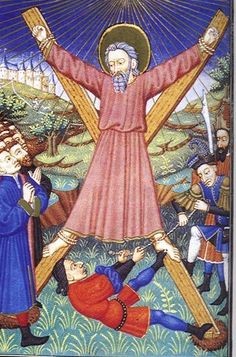
James- was one of three men in Jesus' inner circle. (The others were his brother John and Simon Peter.) When Jesus called the brothers, James and John were fishermen with their father Zebedee on the Sea of Galilee. They left their father and their business to follow Jesus. James was probably the older of the two brothers because he is always mentioned first. Three times James, John, and Peter were invited to witness events no one else saw: the raising of the daughter of Jairus from the dead (Mark 5:37-47); the transfiguration (Matthew 17:1-3); and Jesus' time in the Garden of Gethsemane (Matthew 26:36-37). But James was not above making mistakes. When a Samaritan village rejected Jesus, he and John wanted to call down fire from heaven upon them. This earned them the nickname "Boanerges," or "sons of thunder." The mother of James and John also overstepped her bounds, asking Jesus to grant her sons special positions in his kingdom. James' zeal for Jesus resulted in his being the first of the 12 apostles to be martyred, killed with a sword on order of Herod Agrippa I of Judea, about 44 AD, during a persecution of the church. There are legends that James went to Spain and is buried in the crypt of the Cathedral in Santiago de Compostela.
Peter (aka Simon, or Cephas) - son of John (or Jonah, or Jona); from Bethsaida in Galilee; originally a fisherman; denied Jesus three times; leader of the early Church; tradition (Eusebius) suggests that he was the first Bishop of Antioch in 37AD; and that he was crucified in Rome under Emperor Nero. The Gospel of Mark has been traditionally thought to show the influence of Peter's preaching and eyewitness accounts of events. There is no evidence Peter was ever Bishop of Rome.
John, son of Zebedee - son of Zebedee and Salome, brother of James; tradition holds that he outlived the other apostles and that he was the only one not to die a martyr's death. John appears to have been Jesus' closest friend here on earth. He wrote one of the Gospels, three letters (which are recorded in the Bible) and Revelation.
Philip - from Bethsaida which may connect him to Andrew and Peter who were from the same town; one of the men attached to John the Baptist when John pointed Jesus out as the Saviour; Christian traditions describe him as the apostle who preached in Greece, Syria, and Phrygia, possibly setting out on his own to spread the word; legend also suggests that he was tortured and executed in Hierapolis (a tomb thought to be his was discovered in Hierapolis in 2011). He may or may not have been Philip of Acts 6:5, 8:1-25.
Bartholomew - from Cana; introduced to Jesus by Philip, mentioned several times in the company of Philip so they may have been good friends; also identified as Nathanial (John 1:43-51); legend says he went on a missionary tour to India, Ethiopia, Mesopotamia, Parthia, and Lycaonia, and that he was martyred in Albanopolis in Armenia, either beheaded or flayed alive and crucified
Luke- As the writer of the longest "Gospel" or biography of Jesus, and as the author of Acts, the story of the early church, we owe much of our understanding of Christianity to this first century physician. Most scholars believe Luke was Gentile (there were Gentiles who were interested in Jesus, cf John 12:20, 21); others think he may have been a Hellenised Jew.
Thomas also known as "Doubting Thomas" - tradition holds he travelled outside the Roman Empire to preach the Gospel, traveling as far as India; called "Doubting Thomas" when after Jesus had risen, he said, "Except I shall see in his hands the print of the nails and put my finger into the print, I will not believe.", after which Jesus invited Thomas to touch his wounds. His full name may have been Judas Thomas. Tradition holds that Thomas was killed in 72 AD at Mylapore near Chennai in India possibly by spears or arrows.
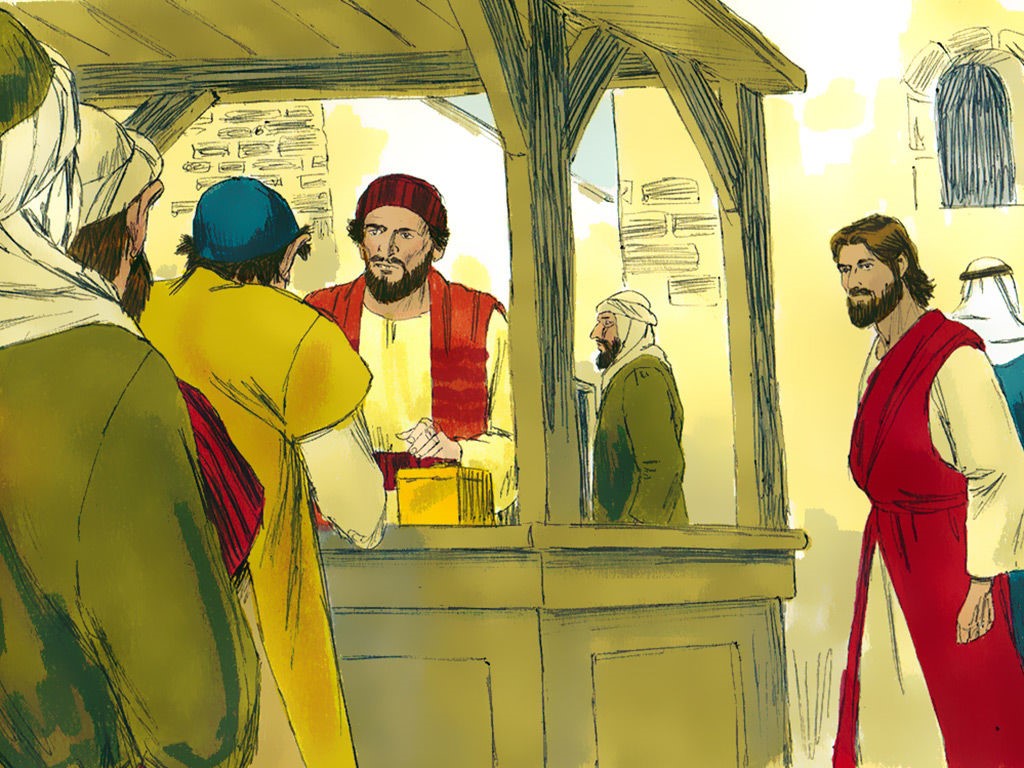
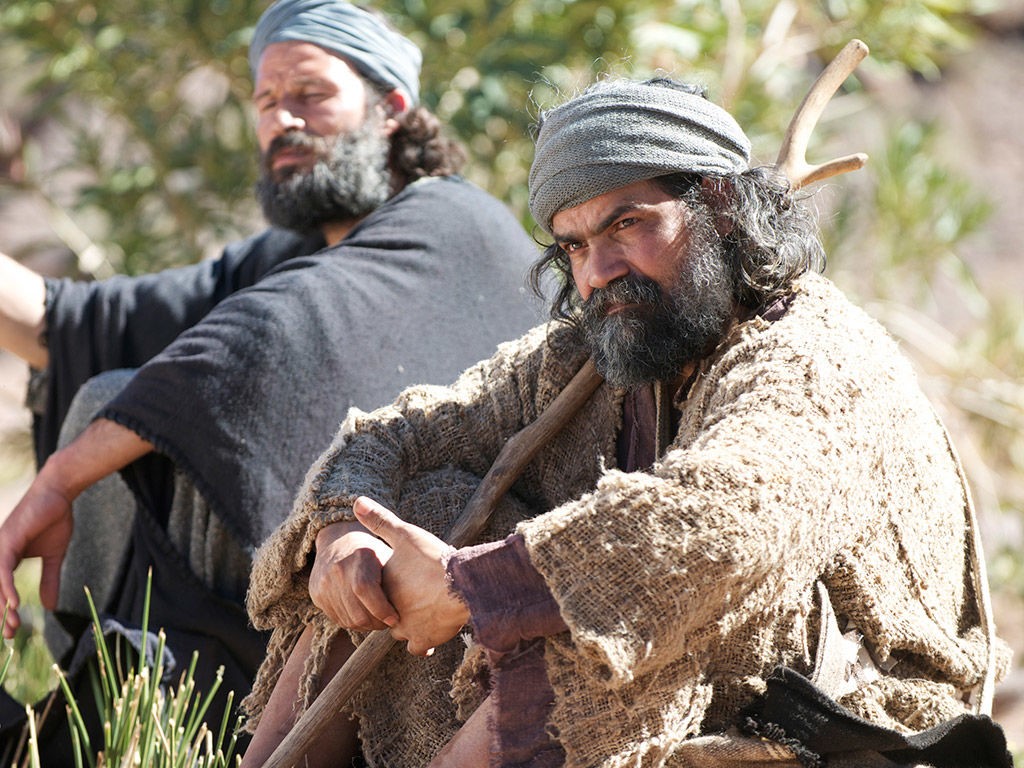
Matthew was a tax collector, until Jesus called him as a disciple. We meet Matthew in Capernaum, in his tax booth, collecting duties on imported goods brought by farmers, merchant, and caravans. Under Roman law, Matthew would have paid all taxes in advance, then collected from the citizens and travelers to reimburse himself (this is called "tax farming)". Tax collectors were educated, but corrupt, extortionists.
Because their decisions were enforced by Roman soldiers, no one dared object. It was scandalous and offensive for Jesus to pick a tax collector as one of his followers, since they were widely hated by the Jews. Also called Levi, son of Alpheus, he is believed to be the author of the Gospel of Matthew.
Simon the Zealot - Believed to have been a member of the Zealous defenders of the Law and of the national life of the Jewish people, a party opposing with rigor any attempt to bring Judea under the dominion of idolatrous Rome, and especially of the aggressive and fanatical war party from the time of Herod until the fall of Jerusalem and Masada. Members of this party bore also the name Sicarii, from their custom of going about with daggers ("sicæ") hidden beneath their cloaks, with which they would stab anyone found committing a sacrilegious act or anything provoking anti-Jewish feeling, eg tax collectors.
James, son of Alphaeus - often identified as James the Less (possibly due to short build or younger age), may have been a brother of Matthew.
Judas, son of James (aka Thaddeus, or Lebbaeus) - not to be confused with Judas the traitor (they are clearly distinguished in the Bible), may have been related to James; some lists of apostles omitted Jude but included "Thaddeus" hinting that possibly his nickname was Thaddeus or that the name "Judas" had been tainted by Judas Iscariot; opinion is divided whether he is in fact the same as Jude, the brother of Jesus; tradition holds that he preached the Gospel in Judea, Samaria, Idumaea, Syria, Mesopotamia, and Libya, and that he suffered martyrdom in 65 AD in Beirut, in the Roman province of Syria; his body was brought to Rome and placed in a crypt in St Peter's Basilica.
Judas Iscariot (the traitor) - a disciple; notorious for the kiss/betrayal of Jesus to Pilate for 30 silver coins (the value of a slave, cf Exodus 21:32); his name suggests he belonged to a nationalist movement of assassins opposing the Romans and their local supporters; he was the treasurer for Jesus & the disciples, but John says that he was a thief (John 12:6); Acts 1:25 shows that he participated in Jesus' ministry; dedicated to tradition holds that he hanged himself following his betrayal, his place later filled by Matthias (see Acts 1).
Barnabas- Name means "son of consolation." He was a Levite who lived on the island of Cyprus. Sold land to give money to the early church. Brought Paul to the apostles at a time when everyone was rejecting him. Travelled with Paul on his first missionary journey. A cousin of Mark, one of the four gospel writers.
Cornelius- A Roman centurion (commander of 100 men), living at Caesarea, the administrative capital of the province, who became the first Gentile Christian.
Timothy- Product of a mixed marriage. Eunice, his Jewish mother, and his grandmother Lois taught him Scripture from infancy. As Paul planted churches, he needed a trustworthy person to carry on after him and chose the zealous young disciple Timothy. As he would be reaching both Jews and Gentiles, Paul he forestalled problems by circumcising Timothy (Acts 16:3). He also taught Timothy about church leadership, as well as many other lessons about running a church (refer 1 & 2 Timothy and Titus.
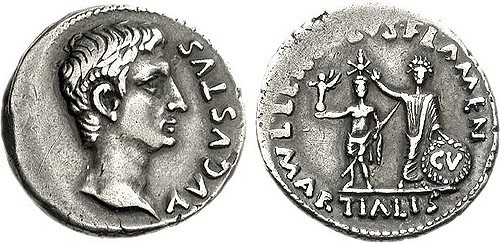
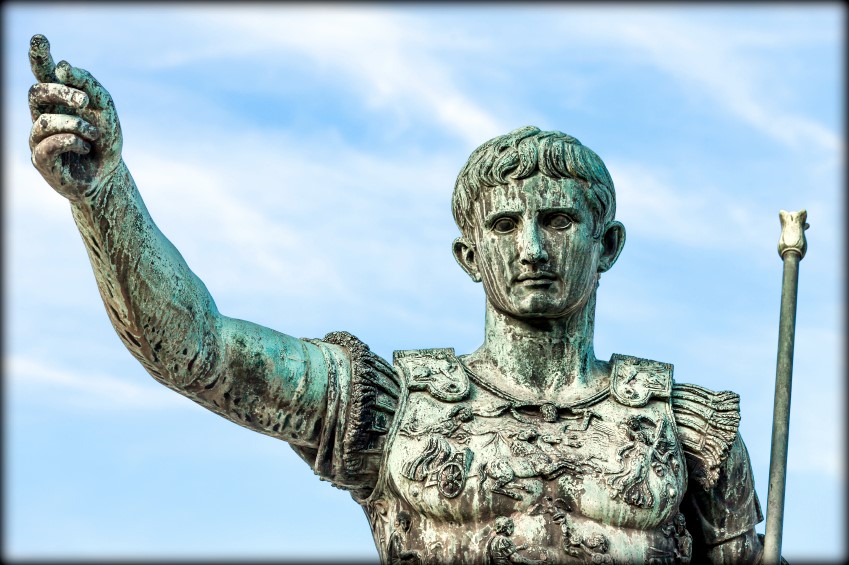
Caesar Augustus - Historians agree that Caesar Augustus was one of the most successful Roman emperors. Born in 63 BC, he reigned as emperor for 45 years, until his death in AD 14. He was the grand nephew and adopted son of Julius Caesar and used the popularity of his great uncle's name to rally the army behind him. Luke tells us that Caesar Augustus ordered a census taken of the entire Roman world, possibly for tax purposes. Palestine was part of that world, so Joseph, the earthly father of Jesus Christ, took his pregnant wife Mary to Bethlehem to register; Joseph was from the house and line of David, who had lived in Bethlehem. Caesar Augustus brought peace and prosperity to the Roman empire. Its many provinces were governed with a heavy hand, yet with some local autonomy.
In Israel, Jews were allowed to maintain their religion and culture. The Sanhedrin, or national council, held power over many aspects of daily life in Jerusalem.
As we have already seen, ironically, the peace and order established by Augustus and maintained by his successors helped in the spread of Christianity. The extensive network of Roman roads (which he especially championed) made travel easier. The Apostle Paul carried his missionary work westward over those roads. Both Paul and the Apostle Peter were believed executed in Rome (under Nero), but not before they had spread the Gospel there, causing the message to fan out on Roman roads to the rest of the ancient world.
Herod the Great - son of Antipater the Idumaean; after defeating and capturing Antigonus II Mattarthias (his nephew), Herod was appointed the Roman king of Judea; reigned from 37-4 BC; described as a madman; murdered his own family and a great many rabbis; known for his colossal building projects; married Antigonus' niece in order to secure a legal claim to the throne and to gain Jewish favor; converted to Judaism (his identification as a Jew was questioned by many), no attempts to gain Jewish favor succeeded and he was hated by many; died an excruciating death likely from kidney disease and gangrene.
Herod Archelaus - son of Herod the Great; after the death of Herod, the kingdom was divided among three of Herod's sons; Archelaus became ruler over the tetrarchy (tetrarchs ruled as governors over a quarter of a province)of Judea and reigned from 4 BC - 6 AD; his violation of Old Testament Law and his extreme cruelty caused the Jews to complain to Augustus, as a result, Archelaus was deposed and banished to Vienne in Gaul (modern-day France).
Herod Antipas - son of Herod the Great, after the death of Herod, the kingdom was divided among three of Herod's sons; Antipas became tetrarch of Galilee and Peraea and reigned from 6 AD - 39 AD; often portrayed as effeminate; known for his role in the events that led to the execution of John the Baptist and Jesus of Nazareth; his divorce from his wife was condemned by John the Baptist and is believed to be the reason Antipas had him arrested and executed; accused by his nephew Agrippa I of conspiracy against the new Roman emperor Caligula who sent him to exile in Gaul.
Pontius Pilate- In 26 A.D. Roman Emperor Tiberius appointed Pontius Pilate Prefect of the provinces of Judaea, Samaria and Idumæa. As Prefect, Pilate had the power of a supreme judge, which included sole authority to order a criminal's execution. The Gospel accounts of the trial of Jesus, Philo and Joseph all described Pilate as being cruel and unfair. The four Gospels describe him as weakly succumbing to the religious authorities' pressure to execute Jesus. They indicate Pilate's indecision, initially conceded to letting Jesus go, but later rescinding the offer. According to some traditions, the Roman emperor Caligula ordered Pontius Pilate to death by execution or suicide. By other accounts, he was sent into exile and committed suicide of his own accord. Some early church records indicate that he may have converted to Christianity, but there is no strong evidence for this. A stone tablet at Caesarea Maritima attests to the life of Pilate.
What Happened to the Apostles?
The only apostle whose death is recorded in the New Testament is James (Acts 12:2). Details of the deaths of the other apostles are subject of church traditions (eg Eusebius), with little or no external evidence:
- Peter - crucified upside-down in Rome in fulfilment of Jesus' prophecy (John 21:18); there is, however, no reliable evidence that Peter ever went to Rome
- Matthew - martyred in Ethiopia, beheaded with a sword
- John - boiled in oil during a wave of persecution; saved from death by a miracle; sentenced to the prison island of Patmos, where he had a vision/s and wrote Revelation; he was later freed and returned to lead a Christian community in Ephesus, in what is now Turkey, where he eventually died peacefully as an old man
- James, the brother of Jesus (not officially an apostle) - thrown from the southeast pinnacle of the temple, then beaten to death with a club
- Mark - died in Alexandria, Egypt after being dragged by horses through the streets
- Bartholomew (Nathanael) - a missionary to Asia; martyred in Armenia
- Andrew - crucified on an x-shaped cross in Greece
- Jude - killed with arrows when he refused to renounce his faith in Christ
- Thomas - stabbed with a spear in India during a missionary trip to establish the church there (Thomasine Christianity is still widespread in southern India)
- Matthias -stoned, then beheaded
- Paul - tortured and then beheaded by Nero in Rome in the year 67
- Phillip - crucified
We will meet other leaders in the early church as we make our way through the NT books.





